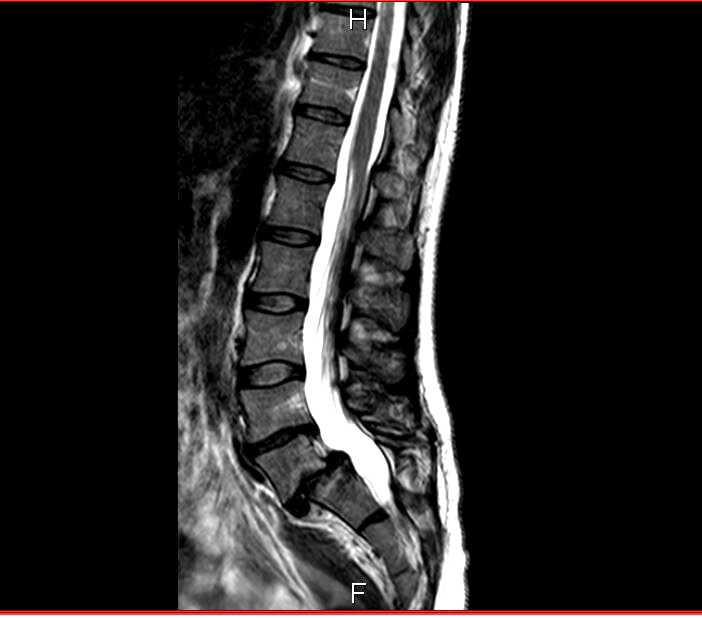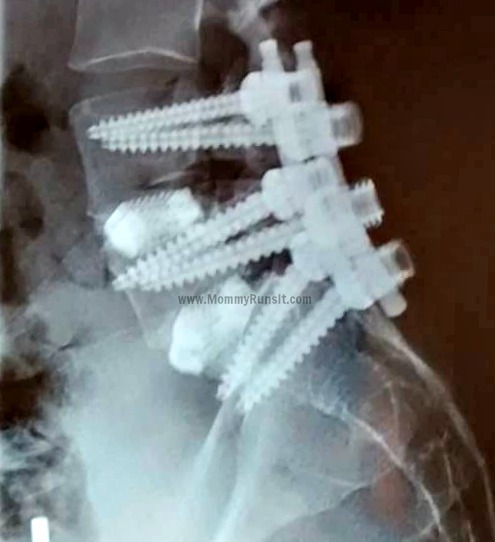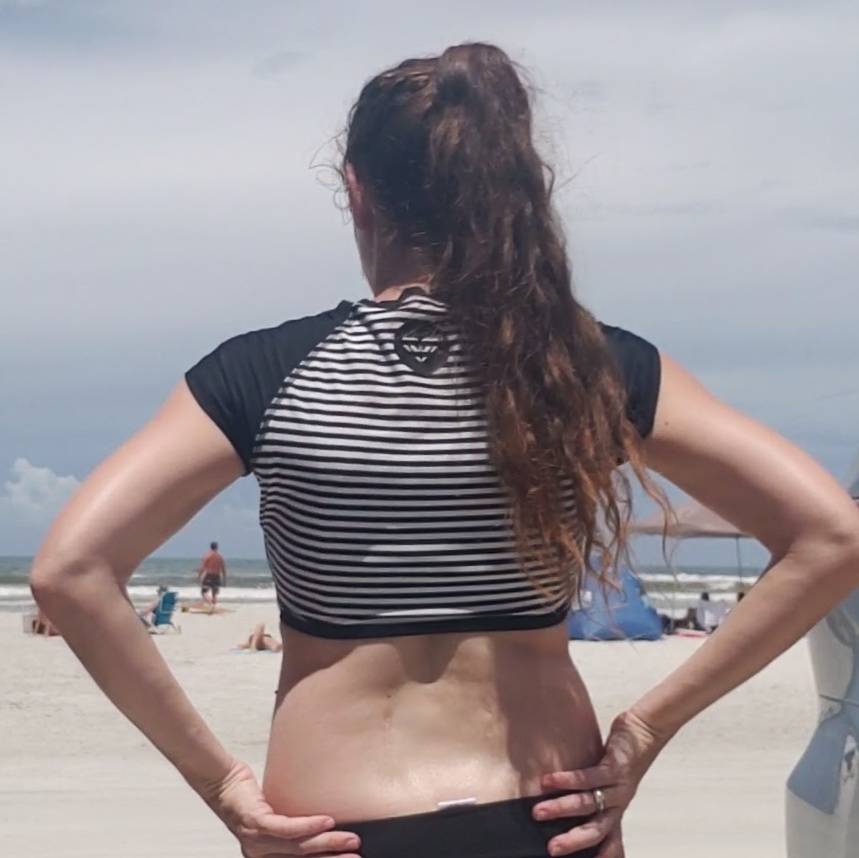My Spinal Fusion Story: Frequently Asked Questions
If you are reading this – well, I’m sorry you ended up here. Having a spinal fusion isn’t fun, and I wouldn’t wish it on anyone. But despite what you may have heard or read online, it is entirely possible to have a positive outcome. So far I’m living proof (knock on wood). I’ve documented my experience on this blog, particularly the months leading up to my surgery in 2016 and my first year post-op. If you’re brand new to this site, Life After Spinal Fusion Surgery (Or What to Expect When Your Bones are Fusing) is a good place to get started. I also have a Spinal Fusion FAQ section. It’s a work in progress, so please feel free to submit your questions and I’ll do my best to address them in a future post.
The page you’re currently reading is another FAQ section, but these questions and answers will specifically address my personal spinal fusion experience. I receive messages almost daily from people who are in all stages of this process, and I read every single one of them! But the truth is that I’m not great about keeping my inbox up-to-date. So instead of waiting for me to respond, you can find the answers to many of the most commonly asked questions on this page. My intention is to provide prompt and easy access to information that may give you some peace of mind. I know it’s not the same as corresponding with a live person, but each answer is heartfelt, just as it would be if you and I were chatting by email or DM.
If you still have questions or want to connect, you can fill out the contact form at the bottom of this page, and I’ll do my best to respond. Also, there are many wonderful people here who respond to comments with their own experiences, so I hope you won’t feel like you’re screaming into the void.
Frequently Asked Questions About My Spinal Fusion Experience
When was your surgery? I had my spinal fusion on May 26, 2016. I was 41 years old.
What type of spinal fusion surgery did you have? I had a minimally invasive TLIF (Transforaminal Lumbar Interbody Fusion. In this type of procedure, the surgeon accesses the spine from the posterior (back area).
Why did you have a spinal fusion? I have spondylolisthesis, a spinal condition in which a vertebra slips forward or backward onto the bone directly beneath it. I was probably born with it. Thankfully, it was not the result of any type of accident or injury. Here is a picture of my spine before surgery:

What levels did you have fused? I’m fused from L4-S1. I had a grade 2 spondylolisthesis (25-50% slip) at L5-S1, and I was originally only supposed to be fused at one level. However, during my procedure, my surgeon discovered that my slip was more “unstable” (showing abnormal movement) than initially thought. I also had a grade 1 (0-25% slip) at L4-L5. For these reasons, he decided to fuse two levels instead of one. I’m grateful for this decision because I think fusing only one level would have increased my odds of needing additional back surgery in the future. This is a picture of my spine 2 weeks after surgery:

Where and how severe was your pain before surgery? I had about a 20-year history of chronic lower back pain. But what led me to seek treatment was actually pretty severe pain in my right hip. I first noticed it while I was running, and I attributed it to a sports-related injury. In the ~6 months between my diagnosis and surgery, I also had an increase in lower back pain, pain in my right leg, and periodic numbness in my right foot.
Why did you decide to have surgery? In my specific circumstances, I felt (and still feel) that I didn’t really have another viable option. I tried physical therapy, NSAIDs, oral and injectable (intramuscular) steroids, muscle relaxers, and epidural steroid injections. Nothing worked, and my quality of life was deteriorating. In November 2015, I ran a half marathon (with some difficulty, but I finished the race). By spring 2016, I was unable to stand in place for more than a few minutes without extreme discomfort.
Where did you have surgery, and how did you choose your surgeon? Neurosurgeon or orthopedic surgeon? I had surgery at Baptist Hospital in Jacksonville, Florida, which is where I live. My primary care doctor referred me to a neurosurgeon, and after two consults with him, I agreed to have the surgery. I did not have a second opinion, but I encourage you to seek one if possible.
How long were you in the hospital after surgery? Two nights, which seems to be shorter than average, but it was fine. I was much happier in my own bed anyway.
When did you start physical therapy? I had in-home physical therapy for my first two weeks at home. I believe the physical therapist came twice a week, but it’s a little hazy. We worked on very basic skills, like log rolling (to get in and out of bed), safely using the walker, and (eventually) getting up and down the stairs in my house. After that, I didn’t start physical therapy again until about 7 or 8 months post-op, and only because I was having a flare-up. My surgeon told me that PT was optional, and I opted against it (which I don’t recommend doing).
Did you have leg pain after surgery? YES!!! I had horrible pain in my left leg (9+ on a 1-10 scale). My pre-op pain was primarily on my right side, so the left leg pain was new, and it was very, very scary. I have since learned that nerve pain (particularly, but not exclusively, in the legs) is common after a lumbar fusion.
How long did the nerve pain last? Did anything help reduce or manage the pain? Most of the nerve pain in my leg was gone by two weeks post-op. I’ve heard of it lasting both longer and shorter than that. I think the key is that this specific pain should eventually resolve. If your nerve pain doesn’t seem to be getting better, or if it’s getting worse, please check in with your doctor. For me, opiates (Percocet & Oxycodone) didn’t help with my nerve pain at all. Robaxin (a muscle relaxant) did seem to help a bit, as did icing my leg. But the only thing that really seemed to help was my TENS unit, although I have no idea if TENS actually helped or if it was just the placebo effect.
Can you feel your hardware after surgery? No, not at all. I thought I could at first, but it was just swelling at the surgical site. It’s not unheard of to feel your hardware, but in my experience, most people don’t.
What do your scars look like? I felt self conscious in a swim suit the first few months after my surgery, but I honestly don’t think about my scars that much anymore. I’ve never had a stranger ask me about them, and I’m not sure how noticeable they are. I have two scars, both about two inches long, on either side of my spine on my lower back.

When were you able to _________ after surgery? At this point it’s hard to remember specifics, but I wrote out a pretty thorough timeline in Life After Spinal Fusion Surgery (Or What to Expect When Your Bones are Fusing). In broad terms, I would say that it took two weeks to feel human, six weeks to feel like myself, and one year to feel normal. By two years and beyond, there was very little from my pre-op life that I couldn’t do (and even better, I could do it without pain).
What is your flexibility like? My flexibility could definitely be better, but to be fair it wasn’t great before surgery either. My hamstrings are very tight and I can’t touch my toes. This isn’t necessarily the norm; plenty of people are able to practice yoga, Pilates, etc. after a spinal fusion. I’m just not one of them. (I do still enjoy yoga, and I’m able to make it work with modifications.)
When were you able to start running again? My surgeon cleared me to run at six months post-op, but I waited at least a year to even attempt it. I’ve jogged a bit here and there, but I’ve yet to really pick it back up again, and I’m not sure if I ever will. However, this is mostly a personal preference. When I run, the impact on my spine is uncomfortable. At this point in time, my desire to run does not outweigh my discomfort + fear of re-injury. But again, this is my choice. If I wanted to run, I’m absolutely physically capable of doing so. I know lots of very successful post-op runners!
What type of exercise do you recommend post-op? Please talk to your surgeon, primary care doctor, oar physical therapist before starting any new type of exercise! Two resources that have been helpful to me are Fitness 4 Back Pain and Forever Fused. Both offer free online resources, as well as paid professional services.
When were you able to travel? I flew from Florida to Washington, DC at about 3.5 months post-op with no issues. I go into a lot of detail about my experience with post-op travel in Spinal Fusion FAQ: How Soon After Surgery Can I Travel?
Was it all worth it? 100% yes. I got my life back.
Do you know other people who’ve documented their spinal fusion experience online? Yes! The first thing I always recommend is to search Instagram for #spinalfusion. There’s a whole community of us on there, most of whom are happy to connect and share their stories. And here are some other resources for you.
Facebook groups (you will have to request to join):
- Spondylolisthesis (Anterolisthesis/Retrolisthesis) Support – this group was incredibly helpful to me, especially in the first few months of my recovery.
- Spinal Fusion Surgery Group I discovered this group fairly recently, and I haven’t participated much, but it seems to be an informative and supportive resource.
Blogs & YouTube Channels
- Totally Screwed Up
- Lydia Kennedy on YouTube
Instagram:
List coming soon. If you’d like your Instagram handle to be included in a list of support resources, please comment on this post or message me here:
If you have other questions, please comment below or fill out the contact form. I’ll do my best to answer. Please know that I’m sending love and healing energy to each and everyone of you. Be well and stay strong.
